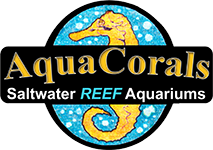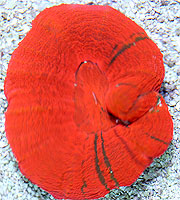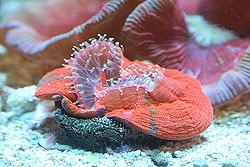
Corals: To Feed OR Not To Feed?
99% of the corals offered in this hobby get their nutrition by a process called photosynthesis. These corals & anemones harbor symbiotic algae in their tissue. It is the algae that utilizes the light & photosynthesizes. A by product of photosynthesis are simple sugars which is food for the host coral & anemones & clams. It is this fact that makes the lighting over our tanks so important....Yet...
It seems everywhere you read there are those who would try & convince you that you MUST supplement feed your corals. The only corals appreciating direct supplemental feeding with the foods we're able to offer are the LPS (large polyp stony) & a few softs (like Ricordea etc.) which have mouths that can intake pieces of food like mysis shrimp & calanus. Even with these, our daily feeding of our fish is usually enough to feed these opportunistic corals as well!
 |
 |
|
LPS coral photosynthesizing. |
Same LPS coral extending it's feeder |
Anemones love the additional feedings given once every couple of weeks but understand, in the ocean, they don't catch fish every day! Their host clownfish etc. do a good job at keeping intruder fish away too. Even with this there are those who would say you have to feed all your corals plankton products or your corals will die. This is absolutely wrong!! It is true that corals gain some nutrition from nutrient absorption and from zooplankton etc. but man has yet to create a plankton product truly useful for the home aquarium.
You will find many who say they saw their corals expand as though trying to feed after these products are added to a tank. This can be so BUT the particles in the products offered today are too big for the corals to digest!! Gut studies of corals after feeding such products showed "no material" taken in. It's easy to understand the corals reaction to the food additive. Just think of Nassarius snails buried deep in the sand only to "pop" out once food is added to our tanks! They "smell" the food right?! Corals react similarly. Now, add to this scenario that the plankton particles which are too big for corals to ingest are also too small for fish to utilize! What happens to the materials we just dumped in? It's now added nutrients to our systems which feeds nuisance algae & cyano bacteria!!
An established reef aquarium will produce its own plankton & all we have to do is get it suspended in the tank so our corals can benefit from it. This is accomplished by gently "storming" the tank once or twice a week with a turkey baster which not only lifts plankton particles but also detritus which can then be captured by our skimmers. This storming method not only supplement feeds our corals it also helps keep our tanks cleaner...the exact opposite of what dumping plankton products does!
Beyond the pictures of my tanks on this web site, anyone who has ever visited AquaCorals can attest to the thriving corals here. Softs and stony corals as well as prolific coraline algae, no nuisance algae & crystal clear water ...yet no plankton additive products are ever used here. Seeing should mean believing.
For more information about "storming a tank" see the Self Help topic "Storms In A Reef Tank"

